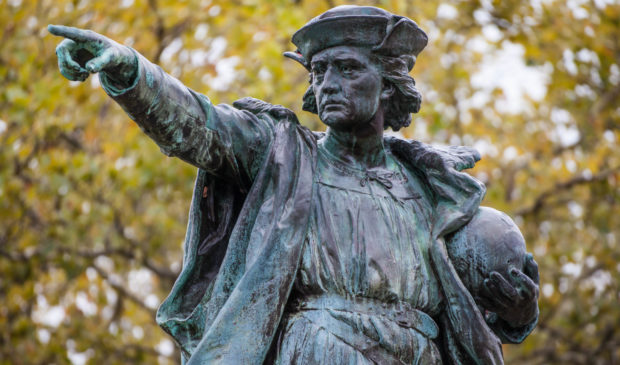Council approves resolution condemning Columbus, celebrating indigenous peoples
Friday, October 6, 2017 by
Jack Craver City Council jumped into the long-standing debate over Columbus Day when it approved a resolution this week in favor of recognizing the second Monday of October as Indigenous Peoples’ Day.
The vote was purely symbolic. Columbus Day has never been an official city holiday; city employees do not get the day off, nor will they now.
“I think it makes a statement that we recognize all the horrors that First Nations tribes and bands suffered,” said Council Member Ora Houston, who authored the resolution, after the vote.
While the dais was united in support of honoring the heritage of Native Americans and recognizing the suffering they endured as the result of European colonization, two members declined to support the resolution because they said they did not want to support “replacing” the traditional celebration of Christopher Columbus.
Houston signaled her intent to recognize both Indigenous Peoples’ Day and Columbus Day in a proposed amendment on the City Council Message Board. However, Houston said she was no longer bringing that amendment forward and later voted against amendments offered by Council members Ellen Troxclair and Alison Alter that sought to recognize both Columbus Day and Indigenous Peoples’ Day.
She told the Austin Monitor that although her inclination was not to support an “either/or” position on the matter, she changed her mind as a result of arguments put forth by her colleagues as well as Tane Ward, an indigenous rights activist who spoke in support of the resolution before the vote.
“As I listened to the conversation and I listened to Dr. Ward, I could feel the hurt, the historical anger of how First Nations had been treated in this country by folks who immigrated from Europe,” she said.
Troxclair spoke of the importance of recognizing the “good and bad parts of our history,” but said that she had heard from Italian-Americans and the Knights of Columbus who felt that “the wording of this resolution is disrespectful to their heritage.”
Troxclair offered an amended resolution that deleted a number of passages, including one that said honoring the legacy of Christopher Columbus “promotes values of intolerance and violence” and another that said the city had a “responsibility to oppose the systematic racism towards Indigenous People.”
Alter similarly offered an amendment to add one word – “also” – so that the recognition of Indigenous Peoples’ Day would be in addition to Columbus Day, rather than instead of it.
That amendment was also defeated, with only Troxclair in support.
In her remarks on the dais, as well as later in an interview with the Monitor, Alter referenced her background as an academic, as well as her husband being a professor of history. Some of the statements in the resolution about Columbus made her uncomfortable, she said.
“History is very complicated. Things are rarely black and white and how we use history matters,” she said.
Council Member Greg Casar described the resolution as a necessary attempt to do away with “myths” that persist, including in public school curricula. He noted that he had seen signs on local businesses announcing that they would be closed on Columbus Day to “celebrate the founding of America.”
“Indigenous folks were the real humans who first came to this land,” said Casar, who has similarly bemoaned “revisionist” history taught in Texas about the Confederacy and the Civil War.
In his remarks to Council, Ward noted that the city of Austin itself was named after a slaveholder who played a key role in displacing the original inhabitants of Central Texas from their ancestral lands. Mirabeau Lamar, for whom the city’s largest boulevard is named, “penned the policy of genocide” against Native Americans as the second president of the Republic of Texas, he said.
Nevertheless, Ward added, he was not advocating a new name for the city or its largest road. Instead, he said, “We’re asking for indigenous people to be honored.”
The final resolution was approved 9-1-1, with Troxclair in opposition and and Alter abstaining from the vote.
This story has been corrected to reflect the fact that Council Member Alter abstained from the final vote and did not vote against the resolution, as was originally reported. Photo by Kenneth C. Zirkel (Own work) [Public domain or CC BY-SA 3.0], via Wikimedia Commons.
The Austin Monitor’s work is made possible by donations from the community. Though our reporting covers donors from time to time, we are careful to keep business and editorial efforts separate while maintaining transparency. A complete list of donors is available here, and our code of ethics is explained here.
You're a community leader
And we’re honored you look to us for serious, in-depth news. You know a strong community needs local and dedicated watchdog reporting. We’re here for you and that won’t change. Now will you take the powerful next step and support our nonprofit news organization?








